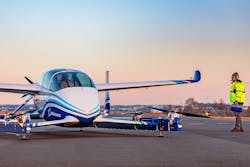Boeing Flying Car Prototype Completes First Test Flight
Boeing said on Jan. 23 that its prototype "flying car" -- part of a project aimed at "on-demand autonomous air transportation" -- has completed its first successful test flight.
The electric vertical takeoff and landing (eVTOL) aircraft said the test was carried out on Jan. 22 outside Washington, D.C.
Boeing is among a handful of companies in the United States and around the world -- including Uber and a startup backed by Google founder Larry Page -- that are developing vehicles which could be used for personal air transport with autonomous navigation.
Boeing NeXt, which leads the company's urban air mobility efforts, utilized Boeing subsidiary Aurora Flight Sciences to design and develop the prototype.
Tests will continue "to advance the safety and reliability of on-demand autonomous air transportation," the company said.
"In one year, we have progressed from a conceptual design to a flying prototype," said Boeing chief technology officer Greg Hyslop.
The vehicle is designed for fully autonomous flight from takeoff to landing, with a range of up to 50 miles.
The craft, which is some nine meters (30 feet) long and 8.5 meters wide, integrates propulsion and wing systems to hover and advance like a helicopter.
"This is what revolution looks like, and it's because of autonomy," said John Langford, CEO of Aurora.
"Certifiable autonomy is going to make quiet, clean and safe urban air mobility possible."
Boeing said it is also working on an unmanned fully electric cargo air vehicle (CAV) designed to transport up to 500 pounds. The cargo vehicle completed its first indoor flight last year and will see outdoor flight testing in 2019.
Aurora, which works on future technologies for Boeing, is headquartered in Manassas, about 30 miles outside Washington, D.C.
Last year, Boeing agreed to establish research and lab space inside a new facility at the Massachusetts Institute of Technology for "future mobility" research.
Boeing and others have discussed the idea of autonomous flying taxis to help ease congestion and improve short-range transportation.
About the Author
Agence France-Presse
Copyright Agence France-Presse, 2002-2025. AFP text, photos, graphics and logos shall not be reproduced, published, broadcast, rewritten for broadcast or publication or redistributed directly or indirectly in any medium. AFP shall not be held liable for any delays, inaccuracies, errors or omissions in any AFP content, or for any actions taken in consequence.
